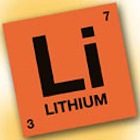The Unique, Safe Mineral with Multiple Uses
By Ward Dean MD and Jim English
 Lithium is a mineral with a cloudy reputation. It is an alkali metal in the same family as sodium, potassium and other elements. Although lithium is highly effective in the treatment of manic depressive illness (X4 DI), its pharmaceutical (prescription) versions – lithium carbonate and lithium citrate – must be used with caution. (1) The reason for the caution with prescription lithium is because lithium in these forms is poorly absorbed by the cells of the body – and it is within the cells that lithium’s therapeutic effects take place. Lithium ions are believed to act only at particular sites on the membranes of intracellular structures like mitochondria and lysosomes.
Lithium is a mineral with a cloudy reputation. It is an alkali metal in the same family as sodium, potassium and other elements. Although lithium is highly effective in the treatment of manic depressive illness (X4 DI), its pharmaceutical (prescription) versions – lithium carbonate and lithium citrate – must be used with caution. (1) The reason for the caution with prescription lithium is because lithium in these forms is poorly absorbed by the cells of the body – and it is within the cells that lithium’s therapeutic effects take place. Lithium ions are believed to act only at particular sites on the membranes of intracellular structures like mitochondria and lysosomes.
Consequently, because of this poor intracellular transport, high dosages of pharmaceutical forms of lithium must be taken in order to obtain a satisfactory therapeutic effect. Unfortunately, these therapeutic dosages cause blood levels to be so high that they border on toxic levels. Consequently, patients taking prescription lithium must be closely monitored for toxic blood levels. Serum lithium and serum creatinine levels of prescription lithium-treated patients should be monitored every 3-6 months.
Toxic effects of lithium may include hand tremors, frequent urination, thirst, nausea, and vomiting. Even higher doses may cause drowsiness, muscular weakness, poor coordination, ringing in the ears, blurred vision, and other symptoms.
There has been concern that long-term lithium treatment may damage kidney function, but data in this regard are equivocal. Renal insufficiency without a known cause has occurred in the general population, and the incidence of renal failure among manic-depressive patients not treated with lithium remains unknown.
Most patients treated with lithium are also taking other medications, and it is just as likely that the few known cases of renal failure in patients taking lithium were due to other medications that they were simultaneously taking. (2-5)
Nevertheless, with potential side effects like this, why in the world would anyone want to take lithium? It is because lithium has been found to be one of the most effective treatments for manic-depressive illness (bi-polar disorder).
Bipolar Disorder
Bipolar disorder is a severe mood disorder characterized by manic or depressive episodes that usually cycle back and forth between depression and mania. The depressive phase is characterized by sluggishness (inertia), loss of self-esteem, helplessness, withdrawal and sadness, with suicide being a risk. The manic phase is characterized by elation, hyperactivity, over-involvement in activities, inflated self-esteem, a tendency to be easily distracted, and little need for sleep. In either phase there is frequently a dependence on alcohol or other substances of abuse. The disorder first appears between the ages of 15 and 25 and affects men and women equally. The cause is unknown, but hereditary and psychological factors may play a role. The incidence is higher in relatives of people with bipolar disorders. A psychiatric history of mood swings, and an observation of current behavior and mood are important in the diagnosis of this disorder. (7)
Orthodox Treatment
Hospitalization may be required during an acute phase to control the symptoms. Antidepressant drugs may be given; anticonvulsants (Carbamazepine, Valproic acid, Depakote) may also be used. (These substances deplete body stores of L-carnitine and Taurine. Supplementation with several grams daily of these supplements greatly ameliorates adverse side effects of these drugs).
Lithium, however, is the treatment of choice for recurring bipolar (manic/depressive) illness, serving as an effective mood enhancer in 70-80 percent of bipolar patients.
Mortality-lowering, Anti-suicidal Effect of Lithium
The mortality of manic-depressive patients is markedly higher than that of the general population. The increased mortality is mainly, but not exclusively, caused by suicide. Studies have shown that the mortality of manic-depressive patients given long-term lithium treatment is markedly lower than that of patients not receiving lithium. The frequency of suicidal acts among treated patients is significantly lower than patients given other antidepressants or carbamazepine. The results of mortality studies are consistent with the assumption that lithium-treatment protects against suicidal behavior. (8-13)
Unipolar Disorder
In addition to its well-recognized benefits in the management of bipolar disorder, trials have conclusively demonstrated that lithium is also an effective treatment for recurrent unipolar depressive illness (recurrent major affective disorder). (14-16) Although physicians in Europe have successfully used lithium for this indication for many years, American psychiatrists do not share their appreciation of lithium’s safety and effectiveness for conditions other than MDI. Perhaps it is due to a difference in the lithium preparations they have at their disposal.
Superiority of Lithium Orotate
The lithium salt of orotic acid (lithium orotate) improves the specific effects of lithium many-fold by increasing lithium bio-utilization. The orotates transport the lithium to the membranes of mitochondria, lysosomes and the glia cells. Lithium orotate stabilizes the lysosomal membranes and prevents the enzyme reactions that are responsible for the sodium depletion and dehydration effects of other lithium salts.
Because of the superior bioavailability of lithium orotate, the therapeutic dosage is much less than prescription forms of lithium. For example, in cases of severe depression, the therapeutic dosage of lithium orotate is 150 mg/day. This is compared to 900-1800 mg of the prescription forms. In this dosage range of lithium orotate, there are no adverse lithium side reactions and no need for monitoring blood serum measurements. (17)
Other Uses for Lithium Orotate
Lithium orotate has also been used with success in alleviating the pain from migraine and cluster headaches, low white blood cell counts, juvenile convulsive disease, alcoholism and liver disorders. (18) Nieper also reports that patients with myopia (nearsightedness) and glaucoma often benefit from the slight dehydrating effect of lithium on the eye, resulting in improvement in vision and reduction of intraocular pressure. (19)
| References |
1. Aronson JK, Reynolds DJM. ABC of monitoring drag therapy: lithium. BMJ. 1992;305: 1273-1276.
2. Schou M, Effects of long-term lithium treatment on kidney function: an overview. J Psychiat Res, 1988;22.,287-296,
3. Waller DG, Edwards TG. Lithium and the kidney: an update. Psycliol Mod. 1989; 19:825-83 1.
4. Gitlin MJ. Lithium-induced renal insufficiency., J Clin Psychopharmacol. 1993) 13:276-279.
5, Kallner G,.Petterson IJ. Renal, thyroid and parathyroid function during lithium treatment: laboratory test in 207 people treated for 1-30 years. Acta Psychiatr Scand. 1995;91:48-5 1.
6. Baastrup PC, Schou M. Lithium as a prophylactic agent: its effect against recurrent depressions and manic-depressive psychosis. Arch Gen Psychiatry. 1967; 16:162-172.
7. Goodwin FK, Jamison KR. Manic-Depressive Illness. Oxford, England: Oxford University Press; 1990.
8. Mueller-Oerlinghausen D, Ahrens B, Volk J, Grof P, Grof E, Schou M, Vestergaard P, Lenz G, Sinihandl C, Tlau K, Wolf R. Reduced mortality of manic-depressive patients in long-term lithium treatment, an international collaborative study by IGSLI. Psychiatry Res. 1991;36:329-331.
9. Ahrens B, Mueller-Oerlinghausen 3, Schou M, Wolf T, Alda M, Grof. E. Grof P, Lejiz G, Simhandl C, Thau K, Vestergaard P, Wolf R, Moeller H. Cardiovascular and suicide mortality of affective disorders may be reduced by lithium prophylaxis. J Affect DI-Y, 1995;33:67-75.
10. Mueller-Oerlinghausen B, Mueser-Causemam B, Volk J. Suicides and parasuicides in a high-risk patient group on and off lithium long-term medication, J Affect Dis. 1992;25: 261-270.
11. Felber- NV, Kyber A. Suizide und Parasuizide wachrend und aubetadserhalb einer Lithiumprophylaxe. In-, Muclicr-Oerlinghausen B, Berghoefer A, eds. Ziele und Ergebnisse der medikagivitoeseyi I-i-opiiylaice affektiver Psychoseii. Stuttgart, Germany, Thieme; 1994:53-59.
12. Thies-Flechtner K, Seibert W, Walther A, Greil W, Mueller-Oerlinghausen B, Suizide bei rezldlvprophylaktisch behandelten Patienten mit affektiven Psychosen. In: Mueller-Oerlinghausen B, Berghoefer A, eds. Ziele und Ergebnisse der medikamentoesen Prophylaxe offekliver Psychosen. Stuttgart, Germany. Thieme; 1994,61-64.
13. Schou M.. Mortality-lowering effect of prophylactic lithium treatment, a look at the evidence, Pharmacopsychiatry. 1995;28: 1.
14. Souza FGM, Goodwin GM. Lithium treatment and prophylaxis in unipolar depression: a meta-analysis, Br J Psychiatry. 1991; 158:666-675.
15. Johnstone EC, Owens DGC, Lambert MT, Crow TJ, Frith CD, Done DJ. Combination tricyclic, antidepressant and lithium maintenance medication in unipolar and bipolar depressed patients. J Affect Dis, 1990;20:225-233,
16. Prien RF, Kupfer DJ, Mansky PA, Small JG, ‘I’uason VB, Voss CB, Johnson WE. Drug therapy in the prevention of recurrences in unipolar and bipolar affective disorders. Arch Gen Psychiatry, 1984;41.1096-1104,
17. Nieper HA The clinical application of lithium orotate. Agressologie 14(6). 407-411, 1973,
18. Sartori HE, Lithium orotate in the treatment of alcoholism and related conditions, Alcohol 1986 Mar; 3 (2): 97-100.
19. Nieper HA The curative effect of a combination of Calcium-orotate and Lithium orotate on primary and secondary chronic hepatitis and primary and secondary liver cirrhosis. From lecture Intl Acad of Prevent Med, Washington, DC March 9, 1974.















[…] stoornis. Maar ook potentie voor Alzheimer, allemaal nog niet bewezen. En paar links hier, hier en hier En naar aanleiding van de the Truth about Cancer, ± 10 dagen het Budwigpapje. Heh, wat the […]
[…] to re-regulate circadian rhythms and the sleep-wake cycle. Recommended dose can range from 15-150 mg a day for severe depression. It is always advisable to work with a knowledgeable clinician who can […]
[…] 1. https://nutritionreview.org/2013/04/lithium-orotate/ […]
[…] As found here: https://nutritherapy.wordpress.com/2010/07/20/lithium-orotate-ted-edwards-dc/ and here https://nutritionreview.org/2013/04/lithium-orotate/ […]
[…] https://nutritionreview.org/2013/04/lithium-orotate/ […]
My son, is bipolar challenged…….he is off the horrendous antipsychotics, but takes 1200 mg a day lithium carbonate (4x300mg). Would it be possible to wean him gradually onto lithium orotate…eg: first step would be to take 3 x 300mg lithium carbonate plus Y mg of lithium orotate…..after 4 weeks monitoring lithium level and go to second step 2 x 300 plus 2Y , then 1* 300 plus 3Y, then finally 4Y to reduce strain on the kidneys…. If so, what dose of Y mg should be used…….
Great question, but I can’t give out medical advice. However, there are some other good resources you can check. See link below – there are a lot of references at the end of the article.
https://www.greatplainslaboratory.com/articles-1/2017/1/23/lithium-the-untold-story-of-the-magic-mineral-that-charges-cell-phones-and-preserves-memory
[…] olmak için çok yararlı olan doğal, yan etkisi olmayan bir alternatiftir. Önerilen doz 15-50 mg arasında değişebilir. Şiddetli depresyon için bir gün. Kişisel bakım ve test sağlayabilen […]
[…] Lithium Orotate […]
[…] rhythms and the sleep-wake cycle. Recommended dose can range from 15-150 mg a day for severe depression. It is always advisable to work with a knowledgeable clinician who […]